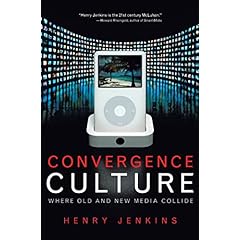Convergence Culture: Technology, Media & Church
 Henry Jenkins is the founder and director of MIT's comparative media studies program and author of numerous books on technology, media and culture. In Convergence Culture, he advances the idea that new media does not replace old media, but that all media learn to interact with one another in a complex relationship called "convergence culture." For example, T.V. does not replace radio, and internet, T.V., but rather, these media become integrated and shape one another to the extent that they spin out the same content in different forms--Garrison Kieller's "Prarie Home Companion," is first radio, then on the web, then in film. Each manifestation of the same content reshapes and influences it. Perhaps a more modern example is that of The Matrix, a film that has its prequel embedded in animae and its post-quel (?) in video games. The content and story of The Matrix is present in three forms which allow the consumer increasingly complex and creative participation in the storyline.
Henry Jenkins is the founder and director of MIT's comparative media studies program and author of numerous books on technology, media and culture. In Convergence Culture, he advances the idea that new media does not replace old media, but that all media learn to interact with one another in a complex relationship called "convergence culture." For example, T.V. does not replace radio, and internet, T.V., but rather, these media become integrated and shape one another to the extent that they spin out the same content in different forms--Garrison Kieller's "Prarie Home Companion," is first radio, then on the web, then in film. Each manifestation of the same content reshapes and influences it. Perhaps a more modern example is that of The Matrix, a film that has its prequel embedded in animae and its post-quel (?) in video games. The content and story of The Matrix is present in three forms which allow the consumer increasingly complex and creative participation in the storyline.Jenkins develops the idea of culture convergence alongside the notions of collective intelligence and participatory culture. Collective intelligence is a term coined by sociologists to refer to the benefits of a community pooling its knowledge in a given subject in order to increase the understanding of each individual in the group beyond the limitations of any one individual. In the age of information and of culture convergence we are easily overcome by the steady stream of fact and fiction. Collective intelligence can help us sort through culture convergence.
Participatory culture is evident in our desire to participate in our entertainment e.g. Survivor, American Idol, and Big Brother. These T.V. programs invite the audience to participate in entertainment through surviving, voting, or just living. As Jenkins writes, he aims at revealing the social and cultural impact of convergence upon our communities, industries, schools and governments. The cultural shift that this phenomenon is producing cannot be underestimated. It is influencing the way we think, act, vote, and live.
Jenkins writes: Right now we are mainly using this collective power through our recreational life, but soon we will be using it for more 'serious' purposes ... changing the way religion, education, law, politics, advertising and even the military operate.
The church must respond. What aspects of culture convergence should be embraced and brought into the church? Internet services, local community groups, interest-specific churches, and animated greeters are already in full swing. Can the collective intelligence of the church compete with the collective intelligence of consumers? Can participatory culture go too far in worship services? Artistic expressions in paint, clay and poetry during the preacher's sermons? Can media overload produce theological obscelence?
In case you dont want to read the whole book, here is an article summary


0 Comments:
Post a Comment
Subscribe to Post Comments [Atom]
<< Home